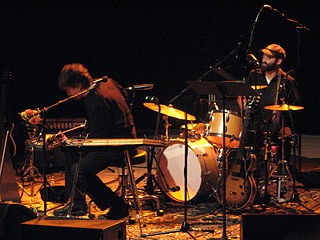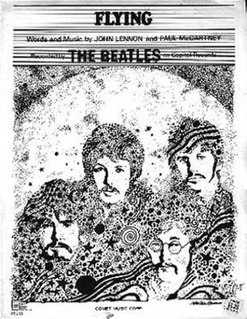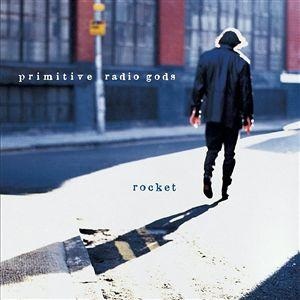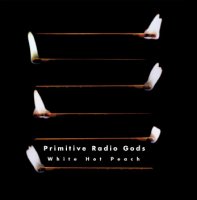
The Beatles, also known as "The White Album", is the ninth studio album by the English rock band the Beatles, released on 22 November 1968. A double album, its plain white sleeve has no graphics or text other than the band's name embossed, which was intended as a direct contrast to the vivid cover artwork of the band's previous LP Sgt. Pepper's Lonely Hearts Club Band. Although no singles were issued from The Beatles in Britain and the United States, the songs "Hey Jude" and "Revolution" originated from the same recording sessions and were issued on a single in August 1968. The album's songs range in style from British blues and ska to pastiches of Chuck Berry and Karlheinz Stockhausen.

The Moody Blues are an English rock band formed in Birmingham in 1964, initially consisting of keyboardist Mike Pinder, multi-instrumentalist Ray Thomas, guitarist Denny Laine, drummer Graeme Edge, and bassist Clint Warwick. The group came to prominence playing rhythm and blues music. They made some changes in musicians but settled on a line-up of Pinder, Thomas, Edge, guitarist Justin Hayward, and bassist John Lodge, who stayed together for most of the band's "classic era" into the early 1970s.

Itch is the second extended play (EP) by English alternative rock group Radiohead, released exclusively in Japan on 1 June 1994 by EMI.
A greatest hits album, sometimes called a "best of" album or a catalog album, is a compilation of songs by a particular artist or band. Most often the track list contains previously released recordings with a high degree of notability. However, to increase the appeal, especially to people who already own the original release, it is common to include remixes or alternate takes of popular songs; sometimes even new material will function as bonus tracks. At times, a greatest hits compilation is the original album release for songs that have themselves been released as a single and charted successfully.

Eels is an American rock band, formed in California in 1995 by singer/songwriter and multi-instrumentalist Mark Oliver Everett, known by the stage name E. Band members have changed across the years, both in the studio and on stage, making Everett the only official member for most of the band's work. Eels' music is often filled with themes about family, death, and lost love. Since 1996, Eels has released twelve studio albums, seven of which charted in the Billboard 200.

Days of Future Passed is the second album and first concept album by English prog rock band The Moody Blues, released in November 1967 by Deram Records. With its fusion of orchestral and rock elements, it has been cited as one of the first examples of progressive rock.

By the Way is the eighth studio album by American rock band Red Hot Chili Peppers. The album was released July 9, 2002 on Warner Bros. Records. It sold more than 286,000 copies in the first week, and peaked at number two on the Billboard 200. Singles from the album included "By the Way," "The Zephyr Song," "Can't Stop," "Dosed" and "Universally Speaking." The lyrical subject matter vocalist Anthony Kiedis addresses in By the Way is a divergence from previous Chili Peppers albums, with Kiedis taking a more candid and reflective approach to his lyrics.

"Flying" is an instrumental recorded by the Beatles which first appeared on the 1967 Magical Mystery Tour release. It is one of the few songs credited to all four members of the band: John Lennon, Paul McCartney, George Harrison, and Ringo Starr.

"Controversy" is a song by American musician Prince, the lead single and title track to his 1981 album. The song addresses speculation about Prince at the time such as his sexuality, gender, religion, and racial background, and how he could not understand the curiosity surrounding him.

"Gone Away" is a song by American punk rock band The Offspring. It is the seventh track on the band's fourth studio album Ixnay on the Hombre (1997) and was released as the second single from the album. It also appears as the sixth track on Greatest Hits (2005). It was written by lead singer Dexter Holland in an emotional response to his then-girlfriend being tragically killed in a car accident.

Recordings is a compilation album by British progressive rock band Porcupine Tree, first released in May 2001. It is mainly a collection of b-sides and unreleased songs from the Stupid Dream and Lightbulb Sun albums' recording sessions. Recordings was originally a limited release, limited to only 20,000 copies worldwide. It was later reissued on CD in September, 2010, and as double vinyl in January 2011.

"We Love You" is a song by the English rock band the Rolling Stones that was written by Mick Jagger and Keith Richards. It was first released as a single on 18 August 1967, with "Dandelion" as the B-side. The song peaked at number 8 in Britain and number 50 in America, where "Dandelion" was promoted as the A-side and peaked at number 14. The recording features a Mellotron part played by Brian Jones and backing vocals by John Lennon and Paul McCartney of the Beatles.

Stop the Clocks is a compilation album by the English rock band Oasis, released on 20 November 2006. The "retrospective collection" is an 18-track double album with the featured songs chosen by Noel Gallagher; however, it does not actually include their song "Stop the Clocks" after which the album is named. It went 5× Platinum in the United Kingdom, with sales better than any Oasis release since Be Here Now.
"Siberian Khatru" is the third song on the album Close to the Edge by English progressive rock band Yes. Live versions of the song are included on the albums Yessongs, Keys to Ascension, Live at Montreux 2003 and In the Present – Live from Lyon. Multiple performances of the song are included on the 2015 boxed-set Progeny: Seven Shows from Seventy-Two, which features seven complete consecutive concerts recorded on the band's late 1972 North American tour. According to an interview with Yes vocalist Jon Anderson, "'Khatru' means 'as you wish' in the Yemeni dialect of Arabic. When we were working on it, I kept singing the word over and over again, even though I had no idea what it meant. I asked somebody to look it up for me, and when they told me the meaning, it worked for the song."

Fading Out is the Primitive Radio Gods' first and only officially released EP. It doubles as an extended single for the song of the same name from the White Hot Peach album. Aside from the title track, the EP contains two songs from Mellotron On! that did not make the cut for White Hot Peach, a remix of "Fading Out", and a new track called "Rope".

French Skyline is the second full-length album by the American electronic band Earthstar. It was their first release for Hamburg, Germany–based Sky Records.

"I Ain't Gonna Stand for It" is the second single from Stevie Wonder's 1980 album, Hotter Than July. It reached number four on the Billboard R&B singles chart and number 11 on the Hot 100. It also hit number 10 on the UK Singles Chart. The song is famous for Wonder's imitation of a seasoned country-and-western crooner and his inspiring drumming. Charlie and Ronnie Wilson of The Gap Band provide backing vocals on the song. It was covered by Eric Clapton in 2001.

Live in Hyde Park is the first live album released by American band Red Hot Chili Peppers, recorded over three record-breaking nights at Hyde Park, in London on June 19, 20 and 25, 2004 during the band's Roll on the Red Tour. These three concerts became the highest-grossing concerts at a single venue in history. This double album compiled from these three shows went straight to No. 1 in the UK and stayed there for a total of two weeks, selling over 120,000 copies.


















